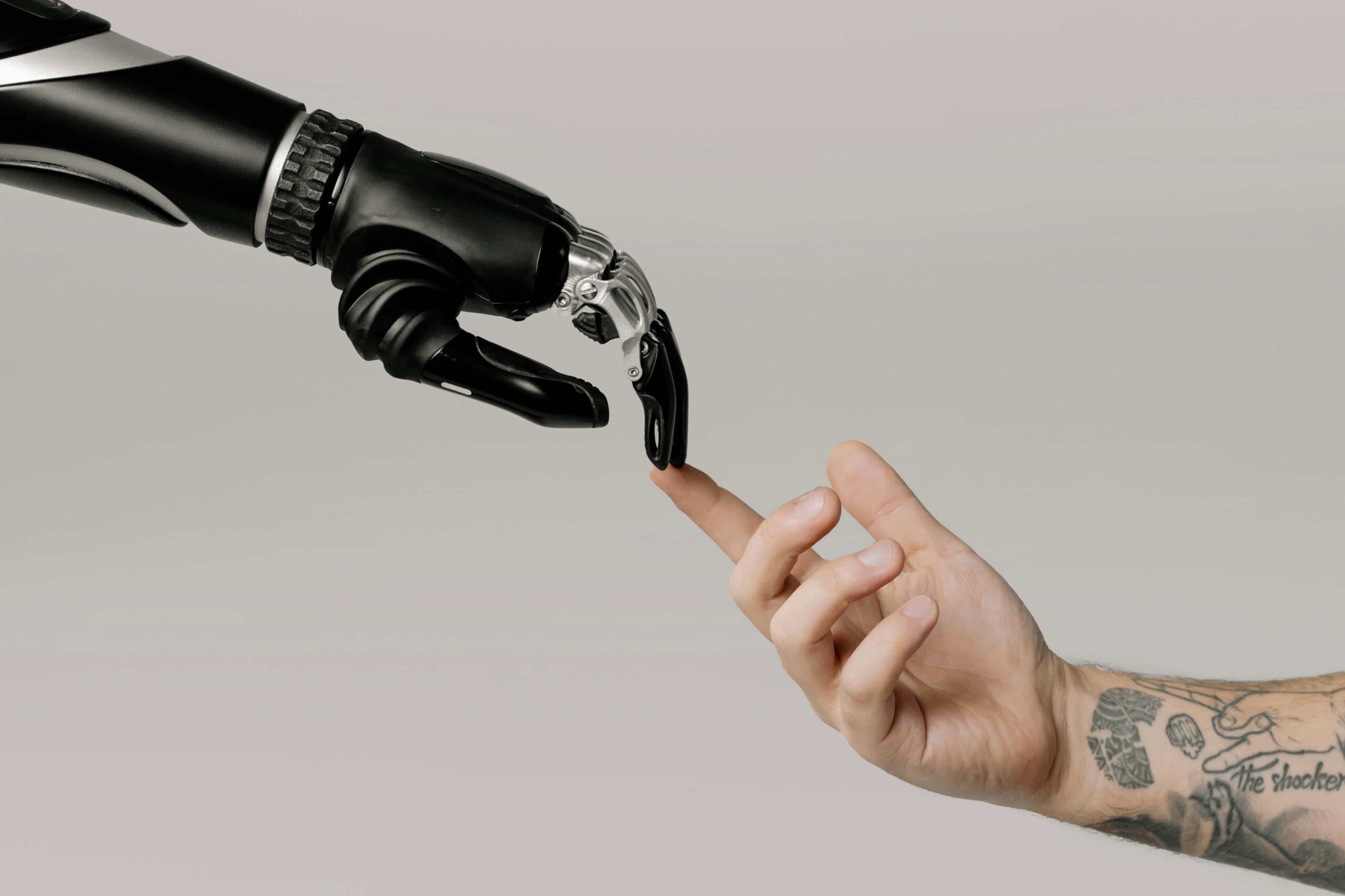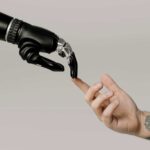Future of Artificial intelligence is changing the world rapidly, like never before. AI is making its presence in almost every field of work because of its ability to think like a human, which was impossible before this recent evolution in AI. The research happening in this field of science is lightning fast, arguably the most significant science and tech revolution of this century. It’s early to say that this revolution is a blessing or disguise, but one thing is sure: AI is not going anywhere, and it will be a part of our lives in many ways whether we like it or not. And like every coin has two sides, so does the revolution of AI.
IMAGE CREDIT : PEXELS
The future of AI in healthcare:
- Finding Diseases Early: AI can work as a super-smart detective for doctors. It can look at lots of information about a person’s health, like test results and pictures of the insides of their body. If there’s something unusual, AI can spot it early, helping doctors treat the problem before it worsens.
- Unique Plans for Each Person: AI can also make treatment plans that are like a personalized guide for each person. It looks at your details and your health history to create a unique plan just for you.
- Predicting pattern of your past health Problems: Imagine AI as a health superhero that can predict if something terrible might happen to you. Looking at your health records can give a heads-up to doctors so they can stop problems before they even start. This is like having a guardian for your health.
- Helping Doctors with non-medical stuff: AI may work as a helpful assistant for doctors, doing tedious tasks like keeping schedules and handling paperwork. This way, doctors have more time to focus on caring for patients, making everything faster. It may be a big boost for countries that are facing doctor shortages.
- Robot Helpers in Surgeries: Imagine a robot assistant helping a surgeon during an operation. AI can make such robots super-precise. It’s like having a trusty sidekick in the operating room.
The role of AI in developing Smarter and Safer Cities:
1. Energy management: Cities are always hungry for energy. The amount of energy cities use is enormous, and the sad part here is most of the energy is wasted. Now, think of some AI systems that can increase or decrease light as required at public places like streets and parks and can do the same with air conditioners at public places like railway stations and airports. These are just a few simple examples. AI will likely be capable of doing more than these and helping cities with better energy management that will reduce the cost of living and help the environment simultaneously because generating electricity is not always eco-friendly.
2. Traffic management: Managing traffic is a big headache in cities nowadays, and it will keep worsening as the population and vehicles on the road increase. AI can be used to manage traffic using advanced AI algorithms and detection methods that are limited to human resources. The use of AI in traffic management is already in action in a few countries, but it needs to expand and evolve for the better. AI-equipped vehicles can play a part in this solution.
3. Law and order management: It may sound dystopian, but a city equipped with an advanced AI system to prevent and fight crime is a good idea any day. It can keep an eye on criminal elements with law enforcement agencies, it can match criminals’ biometrics in data automatically, and an advanced AI algorithm can help in understanding crime patterns and criminal behavior that might be helpful to prevent crime, something like Holden Ford and Bill Tench of Mindhunter. AI can play a crucial role in creating more innovative and safer cities. However, an effective system that can help law enforcement agencies without any operator just on their own, like a Robocop, has yet to be developed.
4. West management and recycling: With the increase in pollution density, managing the west and recycling are going out of hand daily, making it challenging to keep a city clean. Now that your city municipal corporation is taking advantage of AI for west management and recycling, it can be a win-win situation. Keeping a city clean can take a lot of work. Sometimes, we can take the help of robots commanded by their human owners so humans don’t have to do that nasty work like cleaning dirty sewage.
5. Quick Help in Emergencies:
Emergency services face challenges when they are rushed in quickly, or there is a big issue in the city. In such times, an AI assistant can help reduce their load and help them be more effective in emergency calls. Imagine a situation where a fire in a building and going inside is almost impossible, but fighting the fire is necessary at the same time. In such a situation, an AI-powered firefighter can take a risk instead of an actual human, reducing the chances of fatality among helpers.
AI in education will be an integral part of the near future to enhance learning and improve student educational outcomes.
1. Filling gap of teachers: The shortage of qualified teachers in many countries will be mitigated by the integration of AI technology
2. Personalized Learning: In classrooms, it can benefit students in various ways, such as by helping them create study plans and monitoring their advancement.
3. Workload management by Automating Administrative Tasks: It will reduce the workload on teachers by doing non-teaching work, like creating schedules or making mark sheets for the whole class at once.
4. Virtual classrooms: AI will help create virtual classrooms for students to learn and collaborate from anywhere. It will be a blessing for children who cannot attend school for different reasons, such as illness, disability, or a remote location.
5. Intelligent assessments: Changing traditional education methods is necessary. I can do that using advanced algorithm-based evolution of students that can be more effective than exams. Any system like this can also find a lot of students that a traditional exam cannot see.
AI in Agriculture for Sustainable Farming:
Today, the world needs more food than ever. Using AI can significantly increase the quantity and quality of agricultural production in a short period.
1. Precision farming with AI: Using AI, farmers can better understand their fields and crops, which will help them know what and how much is required of them; it will help them give crops what they need.
2.AI for reading weather: the rise of global warming is making it challenging to predict weather. The pattern is so random that it is becoming increasingly difficult to anticipate weather conditions accurately. However, metropolitan departments can use AI to understand patterns and make more precise weather forecasts. This will help them make informed decisions about their crops and protect their harvests from weather-related risks.
3. AI-powered agriculture tools: Such tools can reduce the need for manual labor and increase efficiency in farming practices. It will also increase crop yields and improve overall agricultural productivity. Additionally, AI-powered agriculture tools can aid in precision farming techniques and optimize resource allocation to maximize output and minimize waste.
4. Crop monitoring demands constant human resources and attention to detail. Even then, sometimes errors or oversights can occur. AI-powered micro-drones can do that for farmers by autonomously monitoring crops and identifying potential issues. Sometimes, crop monitoring can be dangerous for farmers, like the danger of wild elephants and snakes. A crop monitoring device can help mitigate those risks by providing real-time information and alerts.
5. AI-based data-driven decision-making: farming is no less than business; AI can help farmers understand trends and market demands and find better prices to sell their products.
Possible cons/downsides of AI in the future:
1. Privacy concern: A world of AI machines and bots can disturb people’s privacy and potentially lead to the exploitation of personal information. It may be a dystopian future where individuals have little control over their data and are constantly monitored and manipulated for various purposes. Governments and big tech worldwide can implement strict regulations and policies to protect individuals’ privacy and prevent such a dystopian future from becoming a reality. But at the same time, rouge elements within these entities can still exploit loopholes and find ways to abuse people’s data for their gain. That may lead to dissatisfaction among ordinary people and an erosion of trust in the system.
2. Job displacement: job displacement because of AI automation has become a growing concern in many industries. People fear AI will replace them because of their high productivity and ability to work 24/7 without needing breaks or benefits. This fear has led to debates about the future of work and the need for retraining and reskilling to adapt to the changing job market. This scenario will affect the whole global economy because to run an economy, people need to expand, and they will only be able to grow if they earn, and if they do their work, how will they raise their earnings? It could lead to a significant economic crisis that could cause widespread unemployment and financial instability. A lack of jobs can make people choose the wrong paths to meet their needs, and if we imagine this scenario, it will be a disaster for society.
CONCLUSION:
How to shape a future balance between the pros and cons of AI in society: The act of balancing the pros and cons of AI will require extreme planning and consideration to ensure that the benefits of AI outweigh any potential drawbacks and that its integration into society. AI will be part of our lives in the future, whether we like it or not, and it is essential to adapt and embrace its potential to thrive in the ever-evolving technological landscape; we should start understanding AI for the better instead of spreading fearmongers. AI could be the most significant boost for the growth of humanity, just as fire and wheels did in the Stone Age, but we must ensure that this growth does not come at the price of sacrificing our privacy and autonomy.



